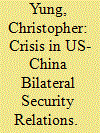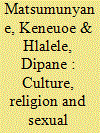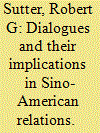| Srl | Item |
| 1 |
ID:
060041


|
|
|
|
|
| Publication |
London, Zed Books, 2005.
|
| Description |
v. 1 (vii, 262 p.)
|
| Contents |
This book is in two volume
Vol.I: Asian Future
Vol II: awaited
|
| Standard Number |
1842773437
|
|
|
|
|
|
|
|
|
|
|
|
Copies: C:1/I:0,R:0,Q:0
Circulation
| Accession# | Call# | Current Location | Status | Policy | Location |
| 049379 | 303.38791/HUT 049379 | Main | On Shelf | General | |
|
|
|
|
| 2 |
ID:
177644


|
|
|
|
|
| Summary/Abstract |
Although the US and Chinese security relationship has been
tense for over three decades, the last three years has seen it
slide into acute crisis. The two countries are in a full-blown
security dilemma, going after each other’s “core interests,”
using their alliances and partnerships to attempt to weaken
or restrain the other, and pushing aside confidence-building measures designed to help manage the competitive
relationship. Before deriving new policy measures that can
foster habits of cooperation between the two countries, the
United States and China must create a new strategic consensus around which the bilateral security relationship can be
defined
|
|
|
|
|
|
|
|
|
|
|
|
|
|
|
|
| 3 |
ID:
167100


|
|
|
|
|
| Summary/Abstract |
This paper explores community dialogues as social interaction in search for sexual diversity in Lesotho, in an effort to influence positive and more directional thinking towards sexuality and sexual behaviour. Guided by queer theory, we firstly explore cultural and religious dimensions defining acceptable and unacceptable sexual behaviour; their influence on attitudes towards the lesbian, gay, bisexual, transgender, questioning (or queer) and intersex (LGBTQI) community, leading to their daily negative encounters; and, lastly, we suggest community dialogues as a mediator that influences more positive attitudes and guides acceptability towards this vulnerable population. Three main themes emerged after the adoption of a thematic analysis: there is denial of the LGBTQI existence; stigma and discrimination towards this minority population also prevail; and the LGBTQI population in Lesotho experience emotional and physical attacks.
|
|
|
|
|
|
|
|
|
|
|
|
|
|
|
|
| 4 |
ID:
124072


|
|
|
|
|
| Publication |
2013.
|
| Summary/Abstract |
This article briefly reviews the role exchanges and dialogues have played in U.S.-China relations since President Nixon's visit to China in 1972, and examines in more detail the process, significance and outlook of recent dialogues. The overall record of dialogues shows that they are important instruments in the policy "tool kit" of each side to deal with salient areas of common interests and disagreement that have broadened in scope as a result of China's rising international importance and the increasing salience of an ever wider range of issues in U.S.-Chinese relations in the 21st century. Both sides view these policy instruments positively; they serve as shock absorbers in periods of difficulty, provide the basis for actual or potential channels of informal communication in times of crisis, and promote efforts to broaden common ground in U.S.-Chinese relations. The checkered record of military exchanges is among the array of evidence showing the reality that dialogues are subservient to the respective interests of the leaders on either side. Dialogues are instruments of improved relations but they do not compel improvement, which at bottom is decided by policy elites in Beijing and Washington. After forty years of efforts to normalize U.S.-China relations, those elites cooperate closely on a wide range of issues but also reflect wariness toward one another that underlines important diverging interests and differences dividing the two powers.
|
|
|
|
|
|
|
|
|
|
|
|
|
|
|
|